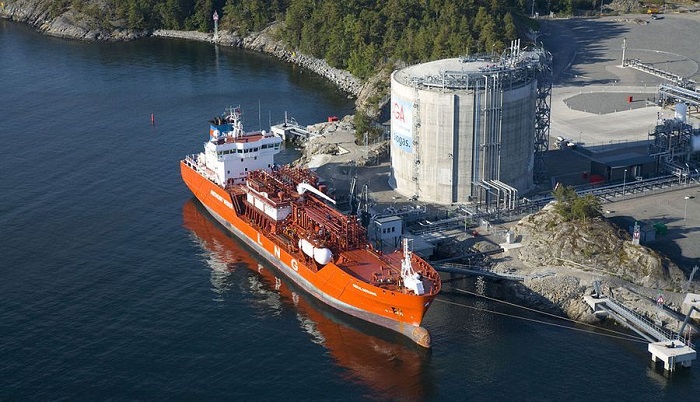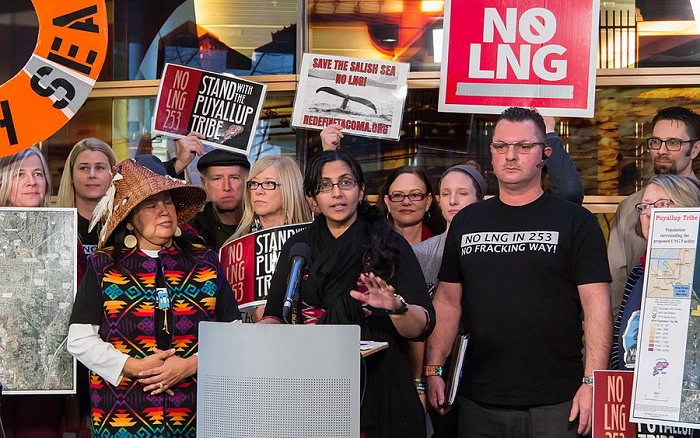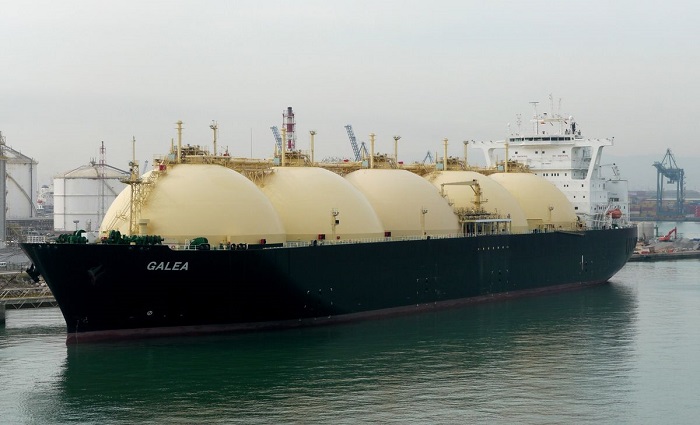PABLO GARCÍA-RUBIO | Tungsteno
Almost one sixth of greenhouse gas emissions are directly related to fuels for trucks, ships and planes. The movement of people and international trade has made the transport sector one of the most polluting, and it faces an urgent challenge: finding new sources of energy that are both clean and economically profitable. Although the availability and cost of liquefied natural gas (LNG) makes it attractive to industry, it is still a fuel that contributes to global warming.
Is natural gas a sustainable option?
LNG is made from natural gas that has been cooled to –162 °C so that it becomes liquid for easy storage and transport. Its use accounts for a quarter of global energy consumption and it is the fossil fuel that contributes least to climate change: CO2 emissions are between 25% and 50% lower compared to other fuels. Emissions of sulphur, nitrous oxides and other particulate matter are also considerably reduced. For this reason, it is considered by some to be the greenest of the viable options for powering container ships or recreational cruise ships.

The transport industry has embraced LNG as a more sustainable alternative to traditional fuels. Credit: Wikimedia.
Xavier Leclercq, a vice-president at container shipping company CMA CGM, says it is "the best available solution over the next 20 years." The lack of development of other clean energies such as hydrogen or electric batteries, according to LNG proponents, make them unviable when it comes to propelling ships of this size. Therefore, they see gas as a transitional element until renewables have the capacity to supply a greater amount of energy in a cheaper and more stable way.
The dark side of the "greenest" fuel
Although LNG is less polluting than coal and oil, it is not emission-free. Natural gas is extracted from below ground, and both the drilling of the rock and the extraction of the feedstock have adverse environmental consequences. The process of hydraulic drilling or fracking, which is the technique used to release and collect the gas trapped in the rock, is in the spotlight because of the impact it has on the ecosystems where it is carried out. The substances used and the aggressiveness of the process cause erosion and sedimentation of the habitat, the release of chemicals into groundwater and surface water, and even the seismic disturbance of the area.

Climate activists and some scientists have taken a stand against LNG because of its environmental impact. Credit: Wikimedia.
On the other hand, methane—the main component of natural gas—escapes into the atmosphere during processing, storage and use, releasing tonnes of methane into the atmosphere each year. In the short term, methane can be a much more harmful greenhouse gas than CO2. Over a 20-year period, one molecule of methane in the atmosphere is about 90 times more efficient at trapping heat than one molecule of CO2. Some studies indicate that for leakage not to be a problem it must not exceed 1%. However, it can be as high as 9%. According to climate scientist Robert Howarth, the argument for using natural gas temporarily as a transition material depends on whether we can control methane emissions, and at the moment we are far from achieving this.
Some processes—such as cooling the material, transporting it and then regasifying it— require large amounts of energy and increase the material's total life-cycle emissions. Researcher Bryan Comer believes that "using LNG to make marine transport greener may sound like a good idea, but if you look at the total impact over the entire life cycle, it is not a great solution." A study by the International Council on Clean Transportation warns that the use of LNG can lead to emissions equal to or worse than traditional fuels in the short term.
Transforming LNG into a "greener" product
Opponents of natural gas use also cite the long-term strategic consequences: creating the infrastructure and investment needed to make gas an available option would prolong our current dependence on fossil fuels and delay the ecological transition to renewables. Research by the Global Energy Monitor research network estimates that plans for LNG expansion in the coming years could lead to global warming similar to the planned expansion of the coal industry.

Technologies such as drones or sensors help monitor leaks and reduce emissions. Credit: Environmental Defense Fund.
The liquefied natural gas industry is expanding and looking for ways to become more sustainable. The main challenge is to detect and reduce methane leaks by improving leak detection technologies with drones or advanced sensors. The extraction and transformation process also aims to improve its environmental impact by using renewable sources or biofuels in its facilities. Meeting the Paris Agreement target of not raising global temperatures above 1.5°C will require a transformation of the energy landscape in the coming decades. Whether LNG will play a key role in powering the engines of international trade and transport will depend largely on industry's ability to adapt its processes to make them more sustainable, embracing technologies that prevent methane emissions and including renewables in its production chain.
· — —
Tungsteno is a journalism laboratory to scan the essence of innovation. Devised by Materia Publicaciones Científicas for Sacyr’s blog.
